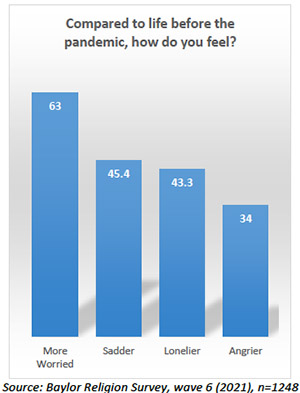WACO—Research confirms what many have suspected—the COVID-19 pandemic is taking a toll on Americans’ mental and emotional health.
Findings from the latest national Baylor Religion Survey found the pandemic has made Americans significantly angrier, sadder, lonelier and more worried.
Wave 6 of the religion survey provided Baylor University researchers with an opportunity to examine the mental health of the American public by asking individuals to reflect on their emotional state during the pandemic compared to their life before.
 Across four emotions—worried, sad, lonely and angry—more than one-third of Americans reported feeling these emotions more strongly compared to before the pandemic. This pattern particularly was apparent for feeling worried, especially for parents with children living at home.
Across four emotions—worried, sad, lonely and angry—more than one-third of Americans reported feeling these emotions more strongly compared to before the pandemic. This pattern particularly was apparent for feeling worried, especially for parents with children living at home.
Americans in poor physical health were more likely to experience all four negative emotions compared to those in better health.
“It is not surprising that parents with children also felt more worry. With abrupt school closures and the complete shut-down of social and recreational activities for children, parents had additional reasons to worry about the state of their children’s future and how to manage their care and education on a daily basis while in many cases shifting to remote work,” said researcher Laura Upenieks, assistant professor of sociology at Baylor.
Young and single adults, Democrats and urban Americans were the groups more likely to experience an increase in negative emotions due to the pandemic. While less likely to be in poor health, young adults—Americans age 18 to 34—in particular experienced increased feelings of loneliness and worry due to the pandemic.
“This group might have borne the brunt of heightened uncertainty as they found themselves trying to attain education or work credentials or trying to establish a career or family life. Such potent disruptions during these formative years, as well as a complete upheaval to their social lives, might have created greater emotional responses,” Upenieks said.
Republicans and Americans in rural areas felt the negative emotional impact of COVID somewhat less. Living in a less population-dense area may have influenced different emotional responses for rural residents, said researcher Rebecca Bonhag, a Baylor sociology doctoral candidate.
Sign up for our weekly edition and get all our headlines in your inbox on Thursdays
“Rural residents may have felt less at risk for infection or could have a stronger social support network living close by,” Bonhag said. “They are also more likely to be conservative, which ties in with the party affiliation trend we observe from the survey results. Polarized media consumption likely has something to do with the partisan trend.”
Baylor Religion Survey researchers now are delving deeper into the causes and effects of these emotional shifts and patterns. With the pandemic continuing to influence day-to-day life, there are concerns that negative emotional responses could continue to impact the lives of Americans.
“If research from the Great Recession of 2007 to 2009 has taught us anything, the emotional inequalities produced and further exacerbated by the COVID-19 pandemic will continue to reverberate for years to come. Every effort should be made to identify vulnerable groups and provide them adequate resources, like counseling, to manage these negative emotions before they potentially spiral into clinical diagnoses,” Upenieks said.

















We seek to connect God’s story and God’s people around the world. To learn more about God’s story, click here.
Send comments and feedback to Eric Black, our editor. For comments to be published, please specify “letter to the editor.” Maximum length for publication is 300 words.